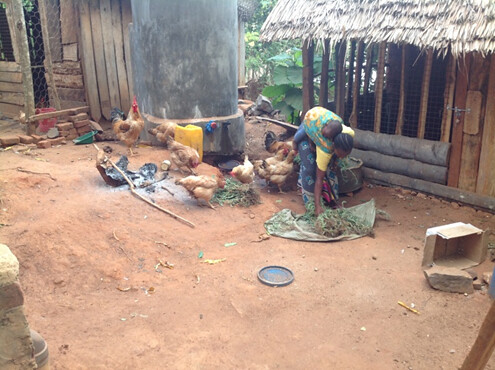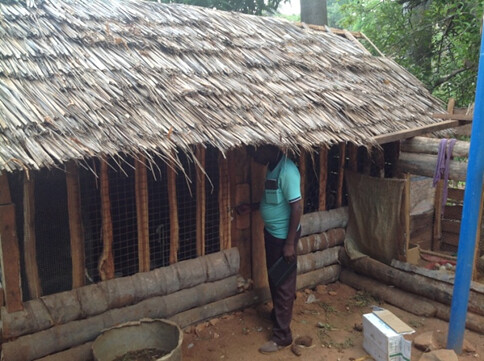Juliana Vincent lives in Kwaisaka Village in Muheza, Tanzania. She is a 30-year-old smallholder farmer who is supported by the International Livestock Research Institute (ILRI)-led African Chicken Genetic Gains (ACGG) project.
In 2004, Vincent started keeping chickens after receiving 6 hens and 2 cocks as a wedding gift from her mother and mother-in-law. The chickens reproduced and she grew her flock to at least 20 birds but by 2009, she had lost all her chickens due to disease. Despite the setback, her husband encouraged her and bought her eight birds for Tsh8,000 (USD3.4).
In 2014, her husband attended a training on chicken management by BRAC, a development organization working in the country after which he bought 10 more hens to add to their flock. They managed to hatch many chicks but had a high mortality rate. A hen could hatch 12 chicks, for instance, but only three or four of them would survive.
Vincent said that she is fortunate to have been selected to join the ACGG project. She says her husband’s support helped her overcome her initial reluctance to fully commit to chicken farming. ‘My husband accompanied me when I went to collect the improved birds from the ACGG project. I was surprised because they were big at only six weeks. I was given 13 cocks and 12 hens and I came back home with high spirits and determined to do whatever it took to have them survive and grow’, she says.
The couple takes turns attending to the chickens, including cleaning their shed, feeding them and other operations. At 19 weeks, some of the birds weighed 3 kg, and some hens had started laying.
‘We were trained on how to make compound feed for the birds including by combining Leucaena leaf meal and layers premix with maize bran to ensure the hens laid eggs regularly. I collect 7-9 eggs per day, which is about 50 eggs per week’, she proudly adds.
She sells an egg for Tsh500 and the demand is high. Sasso eggs are big and many have double yolks. She earns about Tsh12,000 a week and most of the money is used to meet domestic needs. She has also sold 10 cocks for Tsh30,000.
‘I have stopped asking my husband for money to buy household necessities such as sugar and salt,’ she says. Her husband bought barbed wire for fencing the chicken shed and the couple have also constructed a water tank for harvesting rainwater from the roof of their house. The water is used at home and to irrigate a vegetable garden and trees. She expects to begin selling water to neighbours to generate more income in the dry season. ‘Keeping chickens and support from the ACGG project has made me independent’, she concludes.


i love to be part of this project, in Nigeria. how can i go about it, thanks
LikeLike
Quality chicken and eggs in bulk,sheep,goat,pig,cow..STERKSTROOM FARM call Kathrine on 0640135221 or whatsapp for your order and price list we do free delivery
LikeLike